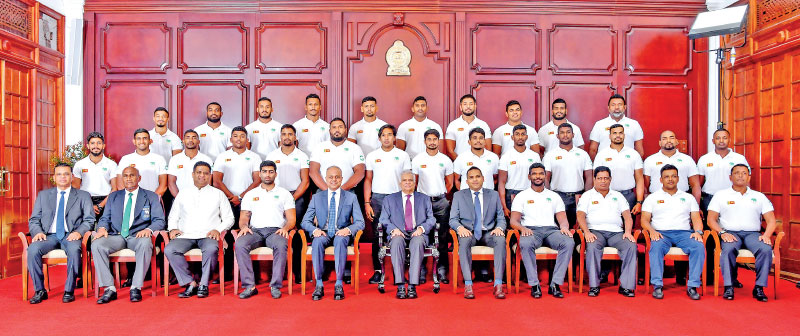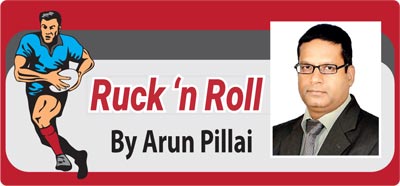Sunday Jan 18, 2026
Sunday Jan 18, 2026
Thursday, 16 May 2024 00:05 - - {{hitsCtrl.values.hits}}

The victorious Sri Lankan Rugby Team at the Asian Rugby Championship in the First Division pose for a group picture with President Ranil Wickremesinghe at a felicitation ceremony hosted by the latter earlier this week

 We have all heard of the saying “distance makes the heart grow fonder”, and some may have experienced it to the extent that it had left a lasting memory.
We have all heard of the saying “distance makes the heart grow fonder”, and some may have experienced it to the extent that it had left a lasting memory.
We have been often deprived of the things we loved, and suffered the intoxicating effects of withdrawal syndromes. Sri Lanka Rugby had to undergo somewhat similar agonies in the past years due to both natural and unnatural causes. All the desire that was restricted and contained over the recent years accumulating pressure, was seen being burst into passionate Rugby at the recently concluded Asia Rugby Division 1 Championship.
None of this could have been possible without the persistent driving forces that worked, not only to lift the ban on SL Rugby, but also persuaded Asia Rugby to host this Tournament in Sri Lanka. However, the lesser-known fact that the players, the coaches and all the support staff came forward to work and play for their country without accepting any fees or wages for this tournament, was indeed a patriotic and inspiring gesture.
The Dual Dozen
A multitude of talented players from various towns, clubs, cultures, ethnicities and beliefs were picked to play for their country, and they left out all their personal aspirations, egos, and rivalries to come together, unite and play as a team. It was fascinating to see these young men who locked horns against each other just over a month ago, to show such maturity and combine beautifully as a team, igniting the much needed patriotism in the stands. These warriors who are now Sri Lanka’s heroes deserve a salute and a standing ovation for their selfless attitudes alone.
The Rock stars of SL Rugby
A very sensible and commendable decision was made by the technical committee of Sri Lanka Rugby (SLR), and an invitation was extended to three Rock stars of Sri Lankan Rugby to coach the national team. They accepted the daunting task without any hesitation, despite being given only 2 weeks to prepare for the tournament. Although some may argue that it would be a walk in the park to train the top skilled players of the country, it is actually a challenging task to get a pool of random players from different Clubs to play as a team within a fortnight, especially considering that rigorous Rugby practice sessions are limited to a few hours per day. In addition, to customise tactics and playing styles against three different potential opponents within this time frame seemed near impossible. However, after the conclusion of the tourney, it was pretty evident that our Rock stars made the international Arena tremble with their powerful lead, rhythm and bass vibes.
When lead coach Sanath Martis was questioned at a pre-match interview as to what his strategy would be against the heavy Indian forwards, his response was to play a wide game. However, when the first long whistle blew, Dushanth Lewke’s Pack formed a moving Boulder as definitive as the Sigiriya Rock, to overrun the sizable opposition to score the first Try. Once the spectators were stunned as much as the Indians were, an array of tries enabled by a series of excellent and timely offloads by the rhythmic Backs resembled the invincible Isipathana backline during the pre-COVID era, especially when the very same Backs Coach Nilfer Ibrahim coached them. It was scintillating to witness the unstoppable backline at work, not on one, but on two consecutive international games.
In addition, SL’s rhythm and bass combined seamlessly like clockwork to the tunes of the lead, and at times it was difficult to tell if the Backs were running the Ball, or the Forwards? The never-ending hard-hitting tactics by the massive Kazakhstan Forwards were cleverly thwarted by playing a strategic low contact, wide running game by the fast Forwards and the furious Backs. An aggressive and attacking mindset topped the icing on the cake which subdued all the errors made by the Tuskers.
Hats off, and a unified national bow to the three mega Rock stars who were brave enough to take on such a challenge at short notice for the sake of their country.
The Big Boys Club
Now that Sri Lanka has qualified to play with the bigger boys of Asia next year, a proper planning is essential in terms of preparation. Many of SL’s flaws were not capitalised by either opposition, and almost all of them that occurred within SL’s 22 are likely to be turned into Tries by the bigger boys. Secondly, the SL team’s focus and performance dropped significantly in the second half, leading to more errors than the first. Lastly, the replacements didn’t quite gel well with the persisting players on the field during both games, and therefore SL will hardly stand a chance with the big guns in its present state.
Our national team requires training for a substantially longer period under its coaching team, in order to condition the players to play according to the varying dynamics, game plans and play styles required by these three coaches. Although highly skilled, their present fitness and skill sets may not be adequate for the national coaching staff, as the game has to be played flawlessly for the full 80 minutes, in order to stand a chance to overcome the stronger Asian opponents, and therefore SLRFA has to get into a lengthy discussion with the head coach well ahead, and detail out the required duration, strength and conditioning, and training requirements.
The unanimous prayer of the SL Rugby community is that the clubs express their patriotism by releasing their contracted players, if and when the call comes to serve the country! An SOS call goes out to all the major brands in Sri Lanka to come forward and sponsor a national Rugby team, which is quite hard for the sports ministry to shoulder on its own, considering the country’s economic state. A timely shove and a push in the right direction will propel Sri Lanka’s Rugby to what its fans aspire it to be; closer to the Try line, and this seems like the most perfect moment.
Planting trees: A noble cause
When no one takes the time to consider or care as to how their actions affect those who are around them anymore, this tournament was purposed to carry a noble objective and message to the Rugby World, making a call to preserve our planet for the next generations. Sustenance of our environment and atmosphere by minimising the carbon footprint was the intended goal and the message.
The SLRFA partnered with “Planet Protectors” (Website: https://planetprotectorslk.org) headed by Most Ven. Thiththagalle Anandasiri Thero, guided by the advisory of Prof. Sarath Kotagama has taken over the task to plant a tree for every point scored in this tournament, although the slogan reads “A Try – A Tree” as it rhymed better. An app has been developed to monitor where the trees are being planted, and cared-for during their initial five years. The mobile app is also capable of tracking trees planted anywhere on earth, and is being currently tested before being rolled out to the public. This is in fact the very first initiative in the world of Rugby, and a brainchild of SLR Chairman Nalin de Silva, to promote the sustenance of the Earth’s environment, and it strives to drive the message and initiative to all the other Rugby playing regions to follow suit.
If anyone dares to ask, what this has got to do with Rugby, then they must read on. We are all aware of how bad the air is in some parts of India, especially Delhi. This only indicates that we are not too far away from the same hazard, now that SL has more coal power plants operating to meet our increased power consumption. Are we going to ignore this fact now, and live our lives in denial until bodies start to drop on the streets due to bad air? Once it finally hits our lungs and our health, it would be way too late for any form of short-term corrective measures, other than to carry oxygen cylinders with us wherever we go.
Going a few months back to the latter part of the Club League, it was observed that both teams played rather erroneously during the second half of some games. The changes in performances between the first and the second half were so drastic, that it was not quite possible to comprehend as to what was going on with both teams at the same time? A possible cause for this could be due to the poor air quality in Colombo, which exceeded 70 AQI (Air Quality Index) on most days, and surpassed 100 on certain days. An active rugby player consumes multiple volumes more oxygen than an ordinary person, and if each breath taken doesn’t contain sufficient quantity of oxygen, it would directly impact the performance immediately, and health of the players in the long run. Shortage of oxygen while playing impacts decision making as well as physical abilities to compete. Thus, if one does not care for the future generations, the hope is that at least they would care for Rugby.